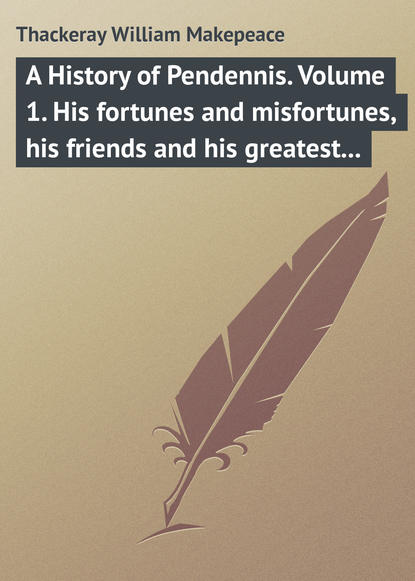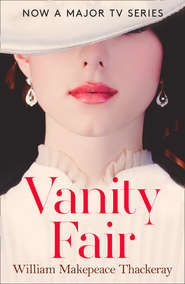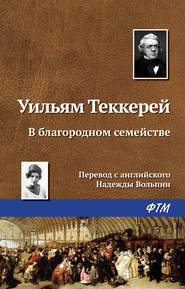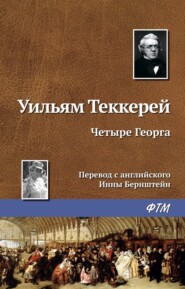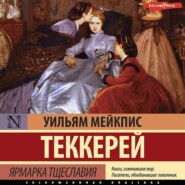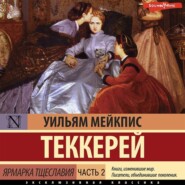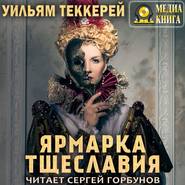По всем вопросам обращайтесь на: info@litportal.ru
(©) 2003-2024.
✖
A History of Pendennis. Volume 1. His fortunes and misfortunes, his friends and his greatest enemy
Настройки чтения
Размер шрифта
Высота строк
Поля
Pen saw his condition, and laughed, although, perhaps, he was somewhat mortified. "Don't you remember me, captain?" he said. "I am Pendennis – Arthur Pendennis of Chatteries."
The sound of the young man's friendly voice recalled and steadied Cos's tipsy remembrance, and he saluted Arthur as soon as he knew him, with a loud volley of friendly greetings. Pen was his dearest boy, his gallant young friend, his noble collagian, whom he had held in his inmost heart ever since they had parted – how was his fawther, no, his mother, and his guardian, the general, the major. "I preshoom, from your apparance, that you've come into your prawpertee; and, bedad, yee'll spend it like a man of spirit – I'll go bail for that. No? not yet come into your estete? If ye want any thrifle, heark ye, there's poor old Jack Costigan has got a guinea or two in his pocket – and, be heavens! you shall never want, Awthur, me dear boy. What'll ye have? John, come hither, and look aloive; give this gentleman a glass of punch, and I'll pay for't. – Your friend? I've seen him before. Permit me to have the honor of making meself known to ye, sir, and requesting ye'll take a glass of punch."
"I don't envy Sir Charles Mirabel his father-in-law," thought Pendennis. "And how is my old friend, Mr. Bows, captain? Have you any news of him, and do you see him still?"
"No doubt he's very well," said the captain, jingling his money, and whistling the air of a song – "The Little Doodeen" – for the singing of which he was celebrated at the Fielding's Head. "Me dear boy – I've forgot your name again – but my name's Costigan, Jack Costigan, and I'd loike ye to take as many tumblers of punch in my name as ever ye loike. Ye know my name; I'm not ashamed of it." And so the captain went maundering on.
"It's pay-day with the general," said Mr. Hodgen, the bass singer, with whom Warrington was in deep conversation: "and he's a precious deal more than half seas over. He has already tried that 'Little Doodeen' of his, and broke it, too, just before I sang 'King Death.' Have you heard my new song, 'The Body Snatcher,' Mr. Warrington? – angcored at Saint Bartholomew's the other night – composed expressly for me. Per'aps you or your friend would like a copy of the song, sir? John, just 'ave the kyndness to 'and over a 'Body Snatcher' 'ere, will yer? – There's a portrait of me, sir, as I sing it – as the Snatcher – considered rather like."
"Thank you," said Warrington; "heard it nine times – know it by heart, Hodgen."
Here the gentleman who presided at the piano-forte began to play upon his instrument, and Pen, looking in the direction of the music, beheld that very Mr. Bows, for whom he had been asking but now, and whose existence Costigan had momentarily forgotten. The little old man sate before the battered piano (which had injured its constitution woefully by sitting up so many nights, and spoke with a voice, as it were, at once hoarse and faint), and accompanied the singers, or played with taste and grace in the intervals of the songs.
Bows had seen and recollected Pen at once when the latter came into the room, and had remarked the eager warmth of the young man's recognition of Costigan. He now began to play an air, which Pen instantly remembered as one which used to be sung by the chorus of villagers in "The Stranger," just before Mrs. Haller came in. It shook Pen as he heard it. He remembered how his heart used to beat as that air was played, and before the divine Emily made her entry. Nobody, save Arthur, took any notice of old Bows' playing: it was scarcely heard amid the clatter of knives and forks, the calls for poached eggs and kidneys, and the tramp of guests and waiters.
Pen went up and kindly shook the player by the hand at the end of his performance; and Bows greeted Arthur with great respect and cordiality. "What, you haven't forgot the old tune, Mr. Pendennis?" he said; "I thought you'd remember it. I take it, it was the first tune of that sort you ever heard played – wasn't it, sir? You were quite a young chap then. I fear the captain's very bad to-night. He breaks out on a pay-day; and I shall have the deuce's own trouble in getting home. We live together. We still hang on, sir, in partnership, though Miss Em – though my Lady Mirabel has left the firm. And so you remember old times, do you? Wasn't she a beauty, sir? Your health and my service to you" – and he took a sip at the pewter measure of porter which stood by his side as he played.
Pen had many opportunities of seeing his early acquaintances afterward, and of renewing his relations with Costigan and the old musician.
As they sate thus in friendly colloquy, men of all sorts and conditions entered and quitted the house of entertainment; and Pen had the pleasure of seeing as many different persons of his race, as the most eager observer need desire to inspect. Healthy country tradesmen and farmers, in London for their business, came and recreated themselves with the jolly singing and suppers of the Back Kitchen – squads of young apprentices and assistants, the shutters being closed over the scene of their labors, came hither, for fresh air doubtless – rakish young medical students, gallant, dashing, what is called "loudly" dressed, and (must it be owned?) somewhat dirty – were here smoking and drinking, and vociferously applauding the songs; young University bucks were to be found here, too, with that indescribable genteel simper which is only learned at the knees of Alma Mater; and handsome young guardsmen, and florid bucks from the St. James's-street Clubs; nay, senators, English and Irish; and even members of the House of Peers.
The bass singer had made an immense hit with his song of "The Body Snatcher," and the town rushed to listen to it. A curtain drew aside, and Mr. Hodgen appeared in the character of the Snatcher, sitting on a coffin, with a flask of gin before him, with a spade, and a candle stuck in a skull. The song was sung with a really admirable terrific humor. The singer's voice went down so low, that its grumbles rumbled into the hearer's awe-stricken soul; and in the chorus he clamped with his spade, and gave a demoniac "Ha! ha!" which caused the very glasses to quiver on the table, as with terror. None of the other singers, not even Cutts himself, as that high-minded man owned, could stand up before the Snatcher, and he commonly used to retire to Mrs. Cutts' private apartments, or into the bar, before that fatal song extinguished him. Poor Cos's ditty, "The Little Doodeen," which Bows accompanied charmingly on the piano, was sung but to a few admirers, who might choose to remain after the tremendous resurrectionist chant. The room was commonly emptied after that, or only left in possession of a very few and persevering votaries of pleasure.
While Pen and his friend were sitting here together one night, or rather morning, two habitués of the house entered almost together. "Mr. Hoolan and Mr. Doolan," whispered Warrington to Pen, saluting these gentlemen, and in the latter Pen recognized his friend of the Alacrity coach, who could not dine with Pen on the day on which the latter had invited him, being compelled by his professional duties to decline dinner-engagements on Fridays, he had stated, with his compliments to Mr. Pendennis.
Doolan's paper, the Dawn, was lying on the table much bestained by porter, and cheek-by-jowl with Hoolan's paper, which we shall call the Day; the Dawn was liberal – the Day was ultra-conservative. Many of our journals are officered by Irish gentlemen, and their gallant brigade does the penning among us, as their ancestors used to transact the fighting in Europe; and engage under many a flag, to be good friends when the battle is over.
"Kidneys, John, and a glass of stout," says Hoolan. "How are you, Morgan? how's Mrs. Doolan?"
"Doing pretty well, thank ye, Mick, my boy – faith she's accustomed to it," said Doolan. "How's the lady that owns ye? Maybe I'll step down Sunday, and have a glass of punch, Kilburn way."
"Don't bring Patsey with you, Morgan, for Georgy's got the measles," said the friendly Mick, and they straightway fell to talk about matters connected with their trade – about the foreign mails – about who was correspondent at Paris, and who wrote from Madrid – about the expense the Morning Journal was at in sending couriers, about the circulation of the Evening Star, and so forth.
Warrington, laughing, took the Dawn which was lying before him, and pointed to one of the leading articles in that journal, which commenced thus —
"As rogues of note in former days who had some wicked work to perform – an enemy to be put out of the way, a quantity of false coin to be passed, a lie to be told, or a murder to be done – employed a professional perjurer or assassin to do the work, which they were themselves too notorious or too cowardly to execute; our notorious contemporary, the 'Day,' engages smashers out of doors to utter forgeries against individuals, and calls in auxiliary cut-throats to murder the reputation of those who offend him. A black vizarded ruffian (whom we will unmask), who signs the forged name of Trefoil, is at present one of the chief bravoes and bullies in our contemporary's establishment. He is the eunuch who brings the bowstring, and strangles at the order of the Day. We can convict this cowardly slave, and propose to do so. The charge which he has brought against Lord Bangbanagher, because he is a liberal Irish peer, and against the Board of Poor Law Guardians of the Bangbanagher Union, is," &c.
"How did they like the article at your place, Mick?" asked Morgan, "when the captain puts his hand to it he's a tremendous hand at a smasher. He wrote the article in two hours – in – whew – you know where, while the boy was waiting."
"Our governor thinks the public don't mind a straw about these newspaper rows, and has told the docthor to stop answering," said the other. "Them two talked it out together in my room. The docthor would have liked a turn, for he says it's such easy writing, and requires no reading up of a subject; but the governor put a stopper on him."
"The taste for eloquence is going out, Mick," said Morgan.
"'Deed then it is, Morgan," said Mick. "That was fine writing when the docthor wrote in the Phaynix, and he and Condy Roony blazed away at each other day after day."
"And with powder and shot, too, as well as paper," says Morgan. "Faith, the docthor was out twice, and Condy Roony winged his man."
"They are talking about Doctor Boyne and Captain Shandon," Warrington said, "who are the two Irish controversialists of the 'Dawn' and the 'Day,' Dr. Boyne being the Protestant champion, and Captain Shandon the liberal orator. They are the best friends in the world, I believe, in spite of their newspaper controversies; and though they cry out against the English for abusing their country, by Jove they abuse it themselves more in a single article than we should take the pains to do in a dozen volumes. How are you, Doolan?"
"Your servant, Mr. Warrington – Mr. Pendennis, I am delighted to have the honor of seeing ye again. The night's journey on the top of the Alacrity was one of the most agreeable I ever enjoyed in my life, and it was your liveliness and urbanity that made the trip so charming. I have often thought over that happy night, sir, and talked over it to Mrs. Doolan. I have seen your elegant young friend, Mr. Foker, too, here, sir, not unfrequently. He is an occasional frequenter of this hostelry, and a right good one it is. Mr. Pendennis, when I saw you I was on the Tom and Jerry Weekly Paper; I have now the honor to be sub-editor of the Dawn, one of the best written papers of the empire" – and he bowed very slightly to Mr. Warrington. His speech was unctuous and measured, his courtesy oriental, his tone, when talking with the two Englishmen, quite different to that with which he spoke to his comrade.
"Why the devil will the fellow compliment so?" growled Warrington, with a sneer which he hardly took the pains to suppress. "Psha – who comes here? – all Parnassus is abroad to-night: here's Archer. We shall have some fun. Well, Archer, House up?"
"Haven't been there. I have been," said Archer, with an air of mystery, "where I was wanted. Get me some supper, John – something substantial. I hate your grandees who give you nothing to eat. If it had been at Apsley House, it would have been quite different. The duke knows what I like, and says to the Groom of the Chambers, 'Martin, you will have some cold beef, not too much done, and a pint bottle of pale ale, and some brown sherry, ready in my study as usual: Archer is coming here this evening.' The duke doesn't eat supper himself, but he likes to see a man enjoy a hearty meal, and he knows that I dine early. A man can't live upon air, be hanged to him."
"Let me introduce you to my friend, Mr. Pendennis," Warrington said, with great gravity. "Pen, this is Mr. Archer, whom you have heard me talk about. You must know Pen's uncle, the major, Archer, you who know every body."
"Dined with him the day before yesterday at Gaunt House," Archer said. "We were four – the French embassador, Steyne, and we two commoners."
"Why, my uncle is in Scot – " Pen was going to break out, but Warrington pressed his foot under the table as a signal for him to be quiet.
"It was about the same business that I have been to the palace to-night," Archer went on simply, "and where I've been kept four hours, in an ante-room, with nothing but yesterday's Times, which I knew by heart, as I wrote three of the leading articles myself; and though the lord chamberlain came in four times, and once holding the royal teacup and saucer in his hand, he did not so much as say to me, 'Archer, will you have a cup of tea?'"
"Indeed! what is in the wind now?" asked Warrington – and turning to Pen, added, "You know, I suppose, that when there is any thing wrong at court, they always send for Archer."
"There is something wrong," said Mr. Archer, "and as the story will be all over the town in a day or two I don't mind telling it. – At the last Chantilly races, where I rode Brian Boru for my old friend the Duke de St. Cloud – the old king said to me, Archer, I'm uneasy about Saint Cloud. I have arranged his marriage with the Princess Marie Cunégonde; the peace of Europe depends upon it – for Russia will declare war if the marriage does not take place, and the young fool is so mad about Madame Massena, Marshal Massena's wife, that he actually refuses to be a party to the marriage. Well, sir, I spoke to Saint Cloud, and having got him into pretty good humor by winning the race, and a good bit of money into the bargain, he said to me, 'Archer, tell the governor I'll think of it.'"
"How do you say governor in French," asked Pen, who piqued himself on knowing that language.
"Oh, we speak in English – I taught him when we were boys, and I saved his life at Twickenham, when he fell out of a punt," Archer said. "I shall never forget the queen's looks as I brought him out of the water. She gave me this diamond ring, and always calls me Charles to this day."
"Madame Massena must be rather an old woman, Archer," Warrington said.
"Dev'lish old – old enough to be his grandmother; I told him so," Archer answered at once. "But those attachments for old women are the deuce and all. That's what the king feels: that's what shocks the poor queen so much. They went away from Paris last Tuesday night, and are living at this present moment at Jaunay's hotel."
"Has there been a private marriage, Archer?" asked Warrington.
"Whether there has or not I don't know," Mr. Archer replied; "all I know is that I was kept waiting four hours at the palace; that I never saw a man in such a state of agitation as the King of Belgium when he came out to speak to me, and that I'm devilish hungry – and here comes some supper."
"He has been pretty well to-night," said Warrington, as the pair went home together: "but I have known him in much greater force, and keeping a whole room in a state of wonder. Put aside his archery practice, that man is both able and honest – a good man of business, an excellent friend, admirable to his family as husband, father, and son."
"What is it makes him pull the long bow in that wonderful manner?"
"An amiable insanity," answered Warrington. "He never did any body harm by his talk, or said evil of any body. He is a stout politician too, and would never write a word or do an act against his party, as many of us do."
"Of us! Who are we?" asked Pen. "Of what profession is Mr. Archer?"
"Of the Corporation of Goosequill – of the Press, my boy," said Warrington; "of the fourth estate."
"Are you, too, of the craft, then?" Pendennis said.
"We will talk about that another time," answered the other. They were passing through the Strand as they talked, and by a newspaper office, which was all lighted up and bright. Reporters were coming out of the place, or rushing up to it in cabs; there were lamps burning in the editors' rooms, and above, where the compositors were at work: the windows of the building were in a blaze of gas.
"Look at that, Pen," Warrington said. "There she is – the great engine – she never sleeps. She has her embassadors in every quarter of the world – her couriers upon every road. Her officers march along with armies, and her envoys walk into statesmen's cabinets. They are ubiquitous. Yonder journal has an agent, at this minute, giving bribes at Madrid; and another inspecting the price of potatoes in Covent Garden. Look! here comes the Foreign Express galloping in. They will be able to give news to Downing-street to-morrow: funds will rise or fall, fortunes be made or lost; Lord B. will get up, and, holding the paper in his hand, and seeing the noble marquis in his place, will make a great speech; and – and Mr. Doolan will be called away from his supper at the Back Kitchen; for he is foreign sub-editor, and sees the mail on the newspaper sheet before he goes to his own."
And so talking, the friends turned into their chambers, and the dawn was beginning to peep.
CHAPTER XXXII.





